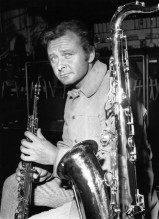"In this world nothing can be said to be certain, except death and taxes.” So wrote Benjamin Franklin in a letter to French historian Jean-Baptiste Leroy, on November 13, 1789. Well, Ben, add another one: change. As a veteran of the Toronto jazz scene I’ve seen a lot of changes. I wish I could say they’ve been for the better, but the sad fact is that looking back is more enjoyable than looking ahead.
What has changed Toronto from being a leading city on the jazz club circuit to the sad state of today? For a start, there is no club circuit any more. Rising costs and declining, aging audiences put paid to that. Touring groups, except for the few that can fill a concert hall, have become a thing of the past. With the demise of the great jazz clubs in this city – the Colonial, Town Tavern, Bourbon Street, Cafe des Copains, Montreal Bistro, Top O’ The Senator, to name only some of them – I feel a sense of loss. The club circuit has its equivalent now in the festival roundabout, relying more and more on ticket sales, often at the expense of the music. And festivals come around once a year; clubs entertained us year round.
Jazz has undergone huge changes since the 1930s when Louis Armstrong was not only a musical genius, he was a pop star. His music was accessible and entertaining. Even into the 1950s jazz was relatively popular, based on a melodic foundation. But it evolved into a complex musical form much of which was no longer easily accepted by the public at large. Audiences started to decline. It was becoming a sophisticated art form rather than an entertainment.
Last month I wrote about nicknames of some of the musicians who played with Duke Ellington. Why did they have nicknames? Because they were colourful characters and it was reflected in their music. In Canada, in his early years Oscar Peterson was “The brown bomber of boogie-woogie.” Trumpeter Jimmy Davidson was “Trump.” But today where are the characters, players who have a personal trademark sound, making them immediately recognizable?
As a profession, jazz is perhaps at its lowest ebb. Making a decent living in jazz has never been easy. Now it is just about impossible. The irony is that jazz has now become something that can be “taught.” In Toronto alone scores of graduates from jazz courses enter a market that hardly exists any more. They have been taught by some of the finest players in Canada – who teach to supplement their income because there isn’t enough work out there to pay the bills. (I know that I’m going to ruffle some feathers by saying such things, but I am echoing what I hear in a lot of opinions expressed when veteran players and aficionados get together.)
Certainly, students can learn to master the techniques and mechanics of playing in all the scales, coming out at the end of it all as superb musicians. But the thing that can’t be taught is the soul of the music. “The teaching of jazz is a very touchy point. It ends up where the jazz player, ultimately, if he’s going to be a serious jazz player, teaches himself.” Whose quotation is that? Pianist Bill Evans. A technically great musician doesn’t necessarily know how to make music.
Some musicians with relatively limited technique made great music: Muggsy Spanier, Pee Wee Russell, Art Hodes, Kid Ory. And – not that I recommend it – greats like Errol Garner and Buddy Rich didn’t even read music. I also believe that a well rounded musician should have a vocabulary which includes songs by the great songsmiths; as well, the great ballad players have also known what the lyric, if there is one, is about.
A well-known Toronto musician once told a story about being on an engagement which was a surprise birthday party. There were a couple of horn players on the gig who were recent graduates of one of the jazz courses. When the guest of honour (a well-known horn player) walked in he asked the band to play “Happy Birthday.” The horn players didn’t know it!
Now, it wasn’t the responsibility of their teachers on the course of studies to teach them that song – it was their job to have it in their musical vocabulary. Not that they would ever choose to play it on a jazz gig, but not all of their gigs are going to be opportunities to play their original compositions. Some gigs are “bread and butter” ones, no matter how well you play.
Here’s a suggestion. If you are a young player about to make your first CD, which nowadays is your calling card, don’t make every number an original composition. Swallow your pride and play at least one number by one of the great songwriters. It gives your listeners a point of reference and demonstrates how well you can interpret one of the numbers which, as I pointed out, should be in any well-rounded musical vocabulary.
 Change is inevitable in any art form, and in many ways reflects the society of its time. And given that we live in a world full of doubt, insecurity and danger to a degree unequalled in this declining civilization, it’s no surprise that much of the joy has gone from the music. So I accept the fact that change is inescapable and indeed necessary. But maybe it’s time to find a word to replace “jazz” – Duke Ellington stopped using the term in 1940 – because much of today’s music simply does not meet the criteria of some of the music’s great players.
Change is inevitable in any art form, and in many ways reflects the society of its time. And given that we live in a world full of doubt, insecurity and danger to a degree unequalled in this declining civilization, it’s no surprise that much of the joy has gone from the music. So I accept the fact that change is inescapable and indeed necessary. But maybe it’s time to find a word to replace “jazz” – Duke Ellington stopped using the term in 1940 – because much of today’s music simply does not meet the criteria of some of the music’s great players.
Here are a few things to consider. Miles Davis: “I don’t care if a dude is purple with green breath as long as he can swing.” Stan Getz: “The saxophone is actually a translation of the human voice, in my conception. All you can do is play melody. No matter how complicated it gets, it’s still a melody.” John Coltrane: “I’ve found you’ve got to look back at the old things and see them in a new light.”
Swing, melodic content and a knowledge of the roots –
I rest my case.
Postscript
I wrote this month’s piece just before leaving for an engagement at Jazzland in Vienna, one of the few remaining jazz venues which presents jazz six nights a week. I’m sitting looking at the photo collection on the walls of musicians who have played the club, among them many of the players who used to appear in Toronto clubs. I can’t stifle a certain feeling of nostalgia and, again, a sense of loss. But then, years from now I’m sure there will be another generation looking back at 2010 as “the good old days.” However, in my present mood, to paraphrase playwright John Osborne, it’s “Look Back In Sorrow.”
Jim Galloway is a saxophonist, band leader and the former artistic director of Toronto Downtown Jazz. He can be contacted at jazznotes@thewholenote.com.



